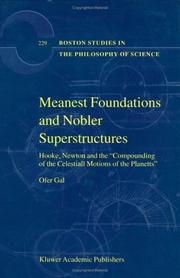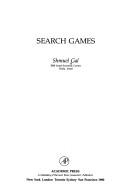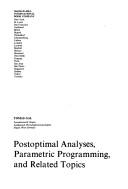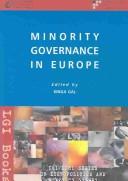| Listing 1 - 10 of 344 | << page >> |
Sort by
|
Book
ISBN: 3319071858 331907184X Year: 2014 Publisher: Cham : Springer International Publishing : Imprint: Springer,
Abstract | Keywords | Export | Availability | Bookmark
 Loading...
Loading...Choose an application
- Reference Manager
- EndNote
- RefWorks (Direct export to RefWorks)
This book describes a novel conception of reality, one that uniquely incorporates an idealistic view of existence with an account of objectivity. It introduces a general model of conceptual analysis and demonstrates its effectiveness in exposing and establishing the existence of conceptual ties. The book begins by introducing the tools and principles needed for the conceptual analysis undertaken in chapters that follow. Next, it presents a detailed examination into existence, contingency, idealism, self-consciousness and natural laws. In the process, the author critically examines the conceptions of existence held by Kant, Frege and Russell; argues that the determinations of past, present and future are subjective in the sense that they imply the existence of consciousness in relation to which they are fixed; shows that every possible reality includes sufficient conditions for self-consciousness; and confronts the question of the "uniformity of nature," which states that reality is subject to natural laws. In the end, the idealistic conception of reality developed in this book implies that existence is relative, rather than absolute, in the sense that it is determined in relation to a point of view internal to reality. This view of existence implies that reality necessarily exists.
Reality --- Metaphysics --- History. --- Philosophy --- Truth --- Nominalism --- Pluralism --- Pragmatism --- Philosophy, modern. --- Metaphysics. --- Linguistics --- Modern Philosophy. --- Philosophy of Language. --- Philosophy. --- God --- Ontology --- Philosophy of mind --- Modern philosophy --- Modern philosophy. --- Language and languages—Philosophy. --- Philosophy, Modern. --- Language and languages --- Early Modern Philosophy.
Book
ISBN: 0575015594 9780575015593 Year: 1974 Publisher: London Gollancz
Abstract | Keywords | Export | Availability | Bookmark
 Loading...
Loading...Choose an application
- Reference Manager
- EndNote
- RefWorks (Direct export to RefWorks)

ISBN: 0122737504 Year: 1979 Publisher: New York
Abstract | Keywords | Export | Availability | Bookmark
 Loading...
Loading...Choose an application
- Reference Manager
- EndNote
- RefWorks (Direct export to RefWorks)
Sociolinguistics --- Austria --- Bilingualism --- -German language --- -Hungarian language --- -Language and languages --- -Linguistic change --- Change, Linguistic --- Language change --- Historical linguistics --- Language and languages --- Foreign languages --- Languages --- Anthropology --- Communication --- Ethnology --- Information theory --- Meaning (Psychology) --- Philology --- Linguistics --- Magyar language --- Finno-Ugric languages --- Ashkenazic German language --- Hochdeutsch --- Judaeo-German language (German) --- Judendeutsch language --- Judeo-German language (German) --- Jüdisch-Deutsch language --- Jüdischdeutsch language --- Germanic languages --- Languages in contact --- Multilingualism --- Social aspects --- Variation --- Oberwart (Austria) --- -Languages --- German language --- Hungarian language --- Linguistic change. --- Social aspects. --- Variation. --- -Felsőőr (Austria) --- Linguistic change --- Characterology of speech --- Language diversity --- Language subsystems --- Language variation --- Linguistic diversity --- Variation in language --- Felsőőr (Austria) --- Languages.
Book
ISBN: 0500271305 9780500271308 Year: 1978 Publisher: London Thames and Hudson
Abstract | Keywords | Export | Availability | Bookmark
 Loading...
Loading...Choose an application
- Reference Manager
- EndNote
- RefWorks (Direct export to RefWorks)

ISBN: 1402007329 9048160677 9401722234 Year: 2002 Volume: 229 Publisher: Dordrecht Kluwer
Abstract | Keywords | Export | Availability | Bookmark
 Loading...
Loading...Choose an application
- Reference Manager
- EndNote
- RefWorks (Direct export to RefWorks)
This book is a historical-epistemological study of one of the most consequential breakthroughs in the history of celestial mechanics: Robert Hooke's (1635-1703) proposal to "compoun[d] the celestial motions of the planets of a direct motion by the tangent & an attractive motion towards a centrat body" (Newton, The Correspondence li, 297. Henceforth: Correspondence). This is the challenge Hooke presented to Isaac Newton (1642-1727) in a short but intense correspondence in the winter of 1679-80, which set Newton on course for his 1687 Principia, transforming the very concept of "the planetary heavens" in the process (Herivel, 301: De Motu, Version III). 1 It is difficult to overstate the novelty of Hooke 's Programme • The celestial motions, it suggested, those proverbial symbols of stability and immutability, werein fact a process of continuous change: a deflection of the planets from original rectilinear paths by "a centraU attractive power" (Correspondence, li, 313). There was nothing necessary or essential in the shape of planetary orbits. Already known to be "not circular nor concentricall" (ibid. ), Hooke claimed that these apparently closed "curve Line[ s ]" should be understood and calculated as mere effects of rectilinear motions and rectilinear attraction. And as Newton was quick to realize, this also implied that "the planets neither move exactly in ellipse nor revolve twice in the same orbit, so that there are as many orbits to a planet as it has revolutions" (Herivel, 301: De Motu, Version III).
Celestial mechanics --- Gravitational astronomy --- Hemelmechanica --- Mechanica [Hemel] --- Mechanics [Celestial ] --- Mécanique céleste --- Celestial mechanics. --- Hooke, Robert, --- Newton, Isaac, --- Newton, Isaac --- Hooke, Robert --- Mechanics, Celestial --- Newton, Izaak, --- Niu-tun, --- Nʹi︠u︡ton, Isaak, --- Niutun, Yisake, --- Niyu̇ton, Isak, --- Nyuṭon, Ayzaḳ, --- Nyuṭon, Ayziḳ, --- ניוטאן, אייזאק, --- ניוטון, אייזק --- ניוטון, אייזיק --- 牛頓, --- 牛頓, 伊萨克, --- Guk, Robert, --- Astrophysics --- Mechanics --- History. --- Philosophy and science. --- Physics. --- Observations, Astronomical. --- Astronomy—Observations. --- Philosophy. --- History, general. --- Philosophy of Science. --- History and Philosophical Foundations of Physics. --- Astronomy, Observations and Techniques. --- Philosophy of Technology. --- Mental philosophy --- Humanities --- Astronomical observations --- Observations, Astronomical --- Natural philosophy --- Philosophy, Natural --- Physical sciences --- Dynamics --- Science and philosophy --- Science --- Annals --- Auxiliary sciences of history

ISBN: 1282290177 9786612290176 0080956572 0122738500 Year: 1980 Volume: v. 149 Publisher: New York : Academic Press,
Abstract | Keywords | Export | Availability | Bookmark
 Loading...
Loading...Choose an application
- Reference Manager
- EndNote
- RefWorks (Direct export to RefWorks)
Search games
Search theory. --- Algebra --- Operations Research --- Civil & Environmental Engineering --- Mathematics --- Physical Sciences & Mathematics --- Engineering & Applied Sciences --- Game theory. --- Games, Theory of --- Theory of games --- Mathematical models --- Operations research

ISBN: 9780070226791 0070226792 Year: 1979 Publisher: New York (N.Y.): MacGraw-Hill
Abstract | Keywords | Export | Availability | Bookmark
 Loading...
Loading...Choose an application
- Reference Manager
- EndNote
- RefWorks (Direct export to RefWorks)
Decision making. --- Linear programming. --- Prise de décision --- Programmation linéaire --- Decision Making --- Linear Programming --- 519.8 --- Linear programming --- Decision making --- Deciding --- Decision (Psychology) --- Decision analysis --- Decision processes --- Making decisions --- Management --- Management decisions --- Choice (Psychology) --- Problem solving --- Matrices --- Production scheduling --- Programming (Mathematics) --- Substitutions, Linear --- Transformations (Mathematics) --- Vector analysis --- Operational research --- 519.8 Operational research --- Prise de décision --- Programmation linéaire
Book
Year: 1969 Publisher: Leiden : Sijthoff,
Abstract | Keywords | Export | Availability | Bookmark
 Loading...
Loading...Choose an application
- Reference Manager
- EndNote
- RefWorks (Direct export to RefWorks)

ISBN: 9639419400 9789639419407 Year: 2002 Publisher: Budapest Open society institute
Abstract | Keywords | Export | Availability | Bookmark
 Loading...
Loading...Choose an application
- Reference Manager
- EndNote
- RefWorks (Direct export to RefWorks)

ISBN: 0122738500 9786612290176 1282290177 0080956572 9780122738500 9780080956572 Year: 1980 Publisher: New York Academic Press
Abstract | Keywords | Export | Availability | Bookmark
 Loading...
Loading...Choose an application
- Reference Manager
- EndNote
- RefWorks (Direct export to RefWorks)
| Listing 1 - 10 of 344 | << page >> |
Sort by
|

 Search
Search Feedback
Feedback About UniCat
About UniCat  Help
Help News
News